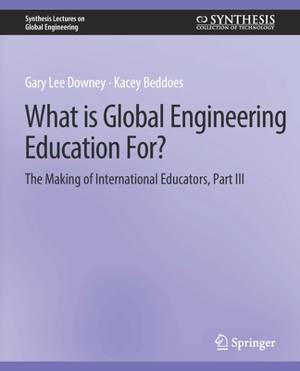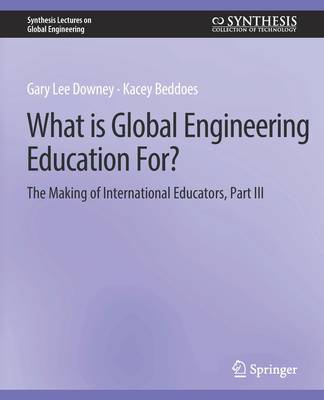
- Afhalen na 1 uur in een winkel met voorraad
- Gratis thuislevering in België vanaf € 30
- Ruim aanbod met 7 miljoen producten
- Afhalen na 1 uur in een winkel met voorraad
- Gratis thuislevering in België vanaf € 30
- Ruim aanbod met 7 miljoen producten
Zoeken
What Is Global Engineering Education For? the Making of International Educators, Part III
Gary Downey, Kacey Beddoes
€ 42,45
+ 84 punten
Omschrijving
Global engineering offers the seductive image of engineers figuring out how to optimize work through collaboration and mobility. Its biggest challenge to engineers, however, is more fundamental and difficult: to better understand what they know and value qua engineers and why. This volume reports an experimental effort to help sixteen engineering educators produce ""personal geographies"" describing what led them to make risky career commitments to international and global engineering education. The contents of their diverse trajectories stand out in extending far beyond the narrower image of producing globally-competent engineers. Their personal geographies repeatedly highlight experiences of incongruence beyond home countries that provoked them to see themselves and understand their knowledge differently. The experiences were sufficiently profound to motivate them to design educational experiences that could provoke engineering students in similar ways. For nine engineers, gaining new international knowledge challenged assumptions that engineering work and life are limited to purely technical practices, compelling explicit attention to broader value commitments. For five non-engineers and two hybrids, gaining new international knowledge fueled ambitions to help engineering students better recognize and critically examine the broader value commitments in their work. A background chapter examines the historical emergence of international engineering education in the United States, and an epilogue explores what it might take to integrate practices of critical self-analysis more systematically in the education and training of engineers. Two appendices and two online supplements describe the unique research process that generated these personal geographies, especially the workshop at the U.S. National Academy of Engineering in which authors were prohibited from participating in discussions of their manuscripts. Table of Contents: Communicating Across Cultures: Humanities in the International Education of Engineers (Bernd Widdig) / Linking Language Proficiency and the Professions (Michael Nugent) / Language, Life, and Pathways to Global Competency for Engineers (and Everyone Else) (Phil McKnight) / Bridging Two worlds (John M. Grandin) / Opened Eyes: From Moving Up to Helping Students See (Gayle G. Elliott) / What is Engineering for? A Search for Engineering beyond Militarism and Free-markets (Juan Lucena) / Location, Knowledge, and Desire: From Two Conservatisms to Engineering Cultures and Countries (Gary Lee Downey) / Epilogue - Beyond Global Competence: Implications for Engineering Pedagogy (Gary Lee Downey)
Specificaties
Betrokkenen
- Auteur(s):
- Uitgeverij:
Inhoud
- Aantal bladzijden:
- 239
- Taal:
- Engels
- Reeks:
Eigenschappen
- Productcode (EAN):
- 9783031009976
- Verschijningsdatum:
- 11/11/2010
- Uitvoering:
- Paperback
- Formaat:
- Trade paperback (VS)
- Afmetingen:
- 190 mm x 235 mm
- Gewicht:
- 430 g

Alleen bij Standaard Boekhandel
+ 84 punten op je klantenkaart van Standaard Boekhandel
Beoordelingen
We publiceren alleen reviews die voldoen aan de voorwaarden voor reviews. Bekijk onze voorwaarden voor reviews.











